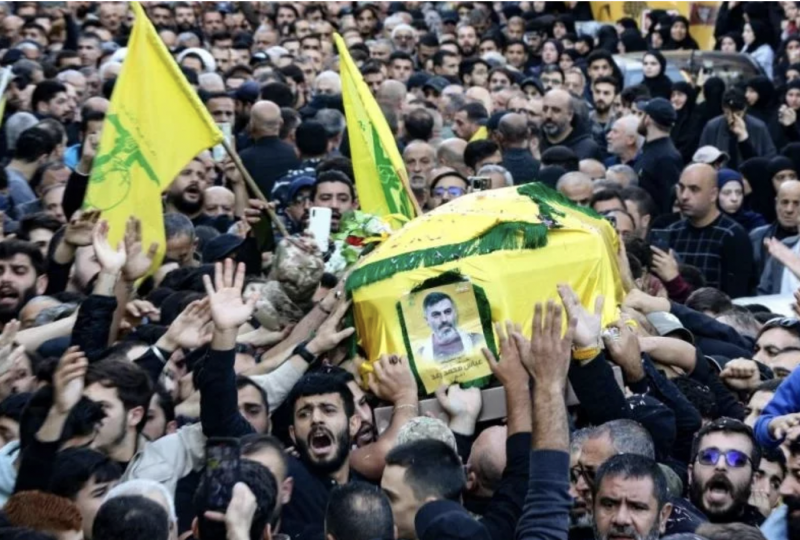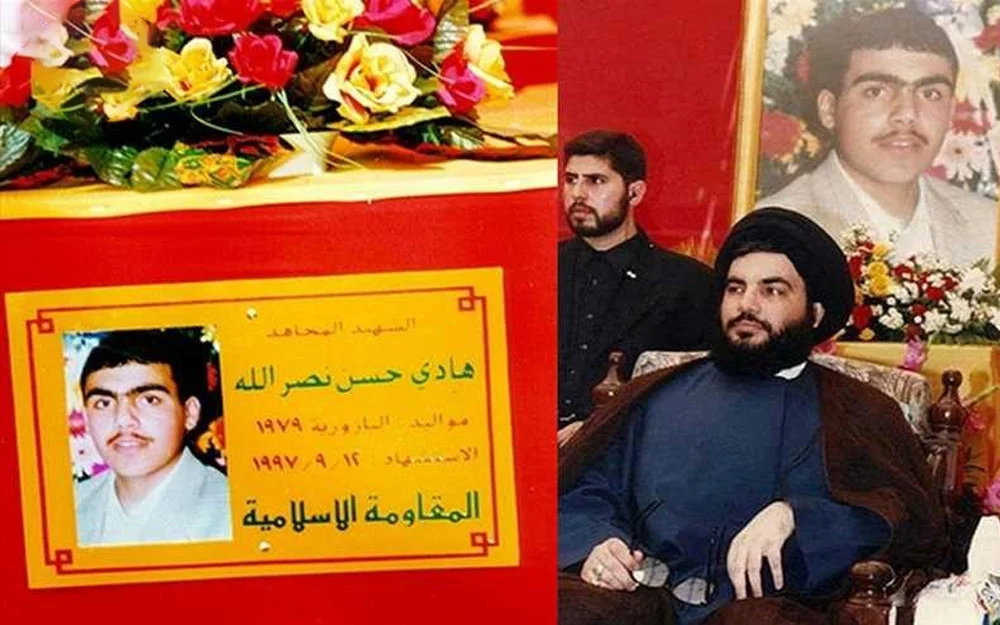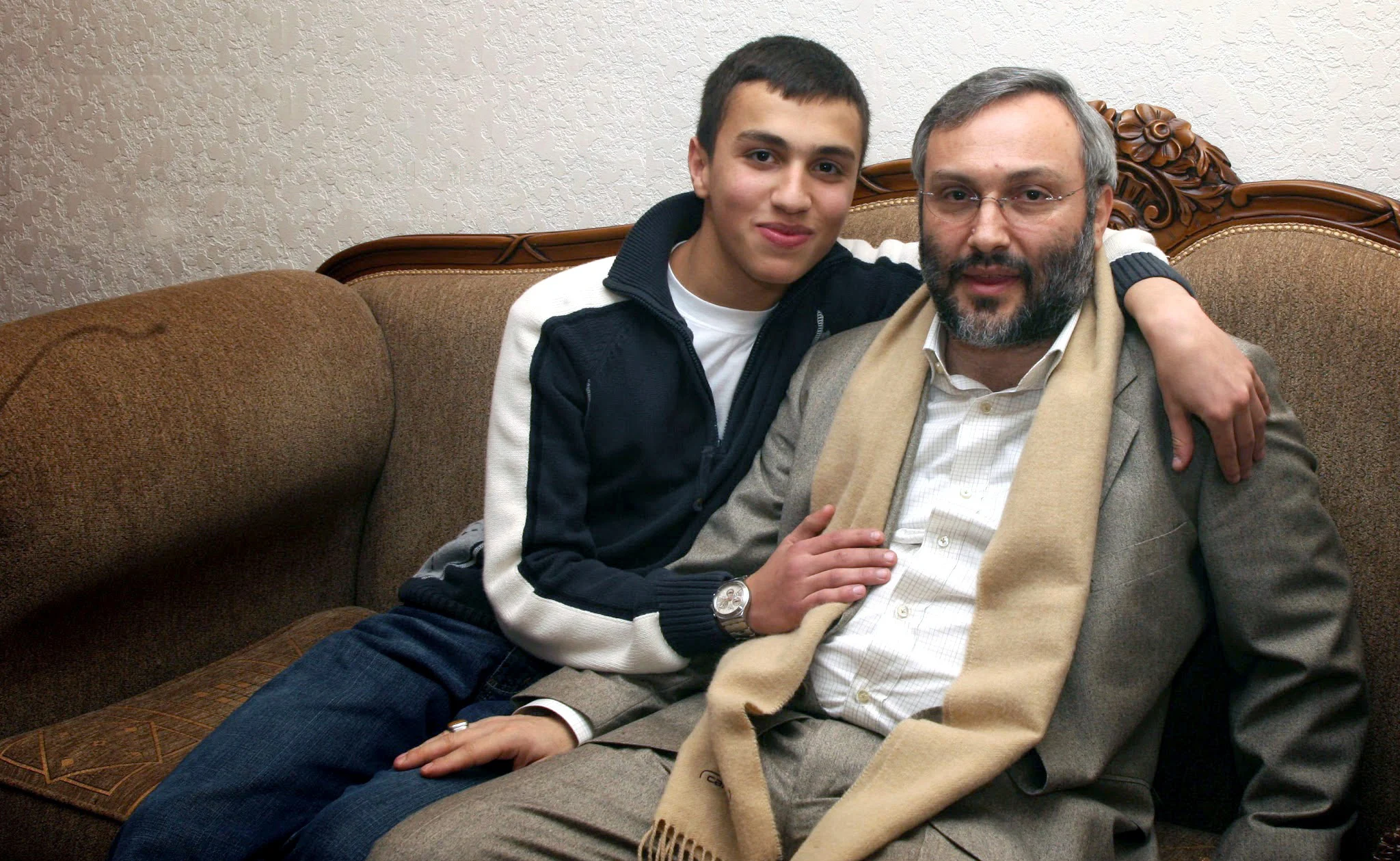
Abbas Raad's funeral in Jbaa, South Lebanon, on Nov. 23, 2023. Abbas, killed in an Israeli strike, was the son of Hezbollah parliamentary group leader Mohammad Raad. (Credit: Mahmoud Zayyat/AFP)
“He wanted it and he got it. If I'm angry with him, it's because he left before I did.” A few hours after the death of his son Abbas in an Israeli strike in Beit Yahoun (Bint Jbeil), which also claimed the lives of four Hezbollah fighters, Mohammad Raad, head of the Shiite party's parliamentary group, made no secret of his pride as he welcomed his mortal remains.
“He was braver and faster than me ... Congratulations to the leader of Hezbollah, who taught us how the fathers of martyrs should be: Patient, strong and persevering on the Jihadist path of resistance,” Raad told the media, waving his index finger firmly.
Behind his restraint lies the whole ideology of “martyrdom” advocated by the pro-Iranian party. Dying to serve the “resistance,” the homeland or the Muslim religion is thus an honor that allows fighters to enter paradise. Since Oct. 8, 85 Hezbollah members have been killed in Israeli strikes, according to a count by L'Orient-Le Jour (77 at least, according to AFP).
Abbas Raad is not the first son of a senior party leader to fall on the battlefield. Indeed, Hezbollah does not hesitate to highlight this fact, showing that its leaders give themselves body and soul, even to the point of losing their children in the service of the cause. Before him, Hadi Nasrallah, Jihad Moughniyeh and Hussein Moussaoui were killed by Israeli strikes.
A look back at the sons of Hezb leaders who died for the "Resistance"
Hadi Nasrallah
The eldest son of Hezbollah's Secretary-General, Hadi Nasrallah underwent several military training courses that enabled him to join al-Radwan force, the Shiite party's elite unit. He died on Sept. 12, 1997, at the age of 18, during an operation against Israeli forces in Iqlim al-Touffah. This took place at the height of the conflict between Lebanon, the Israeli army and the South Lebanon Army (SLA), an Israeli auxiliary. On the same day, Israel also carried out air raids against Lebanese army positions, killing six Lebanese soldiers and one civilian, and wounding six soldiers.
Held by Israel, Hadi Nasrallah's mortal remains were not repatriated until June 26, 1998, following an exchange agreement between Hezbollah and Israel.

Hezbollah Secretary-General Hassan Nasrallah, seated next to the coffin of his son Hadi, killed by the Israeli army on Sept. 12, 1997. (Credit: Photo archive/al-Manar)
On Sept. 14, 1997, a commando group dubbed the “Hadi Nasrallah and Ali Kaoussarani Martyrs' Unit,” named after the son of Hassan Nasrallah and one of his comrades who fell victim to the Israeli army, killed two Israeli soldiers and wounded a third in an explosive attack near the village of Talloussa in southern Lebanon. Israel confirmed the incident and the casualties.
Although the attack was openly claimed, Hezbollah sees it as a continuation of “resistance” operations against Israel. “Israel must take no satisfaction from the death of my son, for he fell on the battlefield,” declared Hassan Nasrallah the day after Hadi's death, before “thanking God for making him a martyr.”
Jihad Moughniyeh
Jihad Moughniyeh met the same fate as his father, seven years after him. Son of former Hezbollah military commander Imad Moughniyeh, assassinated in Damascus in 2008, Jihad died on Jan. 19, 2015 in an Israeli helicopter raid on southeastern Syrian province Quneitra.
This strike on the annexed Golan Heights also killed a senior Hezbollah leader, Mohammad Ahmad Issa, who was in charge of the Syria-Iraq dossier, as well as four Shiite party officials. It also claimed the lives of six Iranian military personnel, including a Revolutionary Guards general.

Former Hezbollah military commander Imad Moughniyeh (R) next to his son Jihad. Both died violent deaths. (Credit: Photo from social networks)
On Jan. 28, 2015, Hezbollah fired anti-tank missiles at an Israeli army convoy in the occupied Shebaa Farms, in what appears to be a retaliatory operation against the Quneitra attack. Two Israeli soldiers were killed and seven wounded. Israel was quick to retaliate, killing a soldier from the Spanish contingent of the United Nations Interim Force in Lebanon (UNIFIL).
Hussein Moussaoui
Hussein Moussaoui is the son of former Hezbollah Secretary-General Abbas Moussaoui. He was killed on Feb. 16, 1992 with his parents, at the age of five, in an Israeli raid in southern Lebanon. After giving a speech in the village Jibsheet (Nabatieh), his father was returning with his family to Beirut. Israeli helicopters attacked the motorcade in which he was travelling.
On March 17, 1992, an organization referring to itself as “Islamic Jihad” carried out a suicide attack on the Israeli embassy in Buenos Aires (29 dead, 242 wounded), claiming to have orchestrated the operation in retaliation for the assassination of Abbas Moussaoui.
On Feb. 7, 1994, Hezbollah ambushed an Israeli army patrol on the Lebanese-Israeli border, killing four soldiers and wounding three others, claiming that the operation marked the second anniversary of the death of former head of the Shiite party.
This article was also published in French.